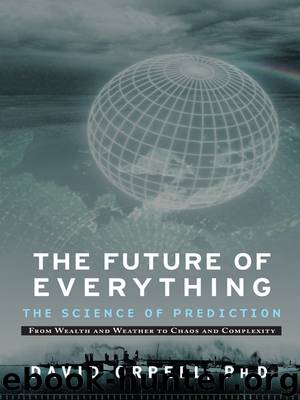The Future of Everything: The Science of Prediction by David Orrell

Author:David Orrell [DAVID ORRELL]
Language: eng
Format: epub
Publisher: Perceus Books Group
Published: 2012-02-05T16:00:00+00:00
PREDICTING THE PREDICTORS
The equilibrium theory saw the homme moyen as a stable, tranquil, emotionally dead person, a mere cog in the machine who would be utterly predictable if it weren’t for the rest of the world, with its constant stream of random and disturbing news. Every time a news flash arrives, the homme moyen responds by fiddling the control knobs on his portfolio. He can always account for his actions later with a cause-and-effect explanation. Louis Bachelier, however, took the idea of randomness a step further. A doctoral student of Henri Poincaré, the discoverer of chaos, Bachelier chose as his thesis subject the chaos that took place at the Paris Exchange, or Bourse, a building modelled after a Greek temple. In his 1900 dissertation, he argued that new information is unpredictable— which is why we call it news—and so is the reaction of investors to that information.14
Most information, after all, has a somewhat ambiguous effect on the market. If the U.S. dollar falls in value, this has one impact on oil producers, another on the tourism industry, another on bakers, and so on, so the net effect in an interconnected world is hard to know to complete accuracy. The price of an asset corresponds to a balance struck in a battle between two opposing, almost animalistic, forces: buyers and sellers, bulls and bears. The reaction of different investors to news will depend on their own subjective interpretation of events, and “contradictory opinions about these variations are so evenly divided that at the same instant buyers expect a rise and sellers a fall.” Therefore, not only is the market subject to random external effects, but its own reaction to that news will also to some degree be random.
Furthermore, Bachelier pointed out that the exchange was involved in a kind of narcissistic dance with itself. Because every financial transaction involves a prediction of the future, this means that a speculator on the Bourse cares less about a sober appraisal of an asset’s worth than he does about the opinions of his colleagues. His aim is to evaluate how much the market is willing to pay at some time in the future. He doesn’t mind overpaying, if he thinks that a greater fool will over-overpay the next day.
Bachelier therefore concluded that movements in the exchange were essentially random. Any connection between causes and effects was too obscure for a human being to comprehend. As he wrote at the beginning of his thesis, “The factors that determine activity on the Exchange are innumerable, with events, current or expected, often bearing no relation to price variation.” Mathematical forecasting was therefore impossible. However, he then made a point that underpins much of modern economic theory, which is that one could “establish the laws of probability for price variation that the market at that instant dictates.” To accomplish this, he assumed in his calculations that market prices followed the normal distribution, which seemed reasonable given its popularity in the physical sciences.
The theory implied that there could be no GCM, no grand model of the economy that could predict future security prices.
Download
This site does not store any files on its server. We only index and link to content provided by other sites. Please contact the content providers to delete copyright contents if any and email us, we'll remove relevant links or contents immediately.
| Fluid Dynamics | Thermodynamics |
The Complete Stick Figure Physics Tutorials by Allen Sarah(6658)
Secrets of Antigravity Propulsion: Tesla, UFOs, and Classified Aerospace Technology by Ph.D. Paul A. Laviolette(3660)
Thing Explainer by Randall Munroe(3350)
The River of Consciousness by Oliver Sacks(3008)
The Order of Time by Carlo Rovelli(2754)
I Live in the Future & Here's How It Works by Nick Bilton(2539)
How To by Randall Munroe(2521)
A Brief History of Time by Stephen Hawking(2488)
The Great Unknown by Marcus du Sautoy(2200)
What If?: Serious Scientific Answers to Absurd Hypothetical Questions by Randall Munroe(2184)
Blockchain: Ultimate Step By Step Guide To Understanding Blockchain Technology, Bitcoin Creation, and the future of Money (Novice to Expert) by Keizer Söze(2149)
Midnight in Chernobyl by Adam Higginbotham(2091)
Networks: An Introduction by Newman Mark(2008)
The Meaning of it All by Richard Feynman(1918)
Easy Electronics by Charles Platt(1877)
The Tao of Physics by Fritjof Capra(1866)
When by Daniel H Pink(1785)
Midnight in Chernobyl: The Untold Story of the World's Greatest Nuclear Disaster by Adam Higginbotham(1782)
Introducing Relativity by Bruce Bassett(1761)
